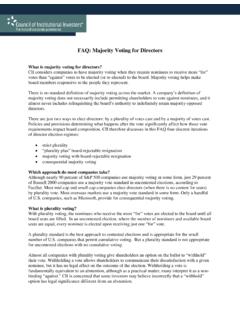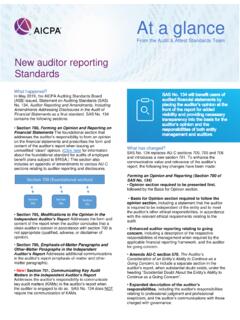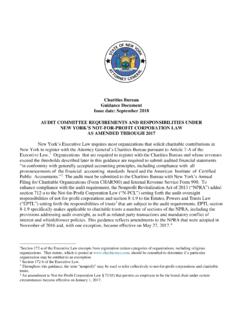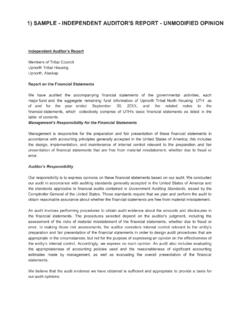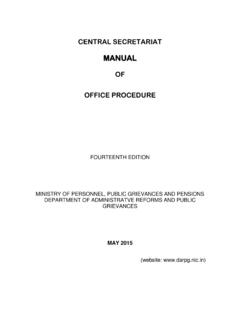Transcription of CORPORATE GOVERNANCE POLICIES - Council of …
1 Updated October 24, 2018 CORPORATE GOVERNANCE POLICIES 2 Council of Institutional Investors CORPORATE GOVERNANCE POLICIES TABLE OF CONTENTS Preamble 1. Introduction Nature and Purpose of the Council s CORPORATE GOVERNANCE POLICIES Federal and State Law Compliance Disclosed GOVERNANCE POLICIES and Ethics Code Accountability to Shareowners Shareowner Participation Business Practices and CORPORATE Citizenship GOVERNANCE Practices at Public and Private Companies Reincorporation Judicial Forum Commitment to Long-Term Performance 2. The Board of Directors Annual Election of Directors Director Elections Independent Board Independent Chair/Lead Director All-independent Board Committees Board Accountability to Shareowners Board s Role in Risk Oversight Board/Director Succession Planning and Evaluation CEO Succession Planning Continuing Directors Board Size and Service Board Operations Auditor Independence Charitable and Political Contributions Directors with Conflicts 3.
2 Shareowner Voting Rights Right to Vote is Inviolate Access to the Proxy One Share, One Vote Advance Notice, Holding Requirements and Other Provisions Confidential Voting 3 Council of Institutional Investors CORPORATE GOVERNANCE POLICIES Voting Requirements Broker Votes Bundled Voting 4. Shareowner Meetings Selection and Notification of Meeting Time and Location Shareowner Rights to Call Special Meetings Record Date and Ballot Item Disclosure Timely Disclosure of Voting Results Election Polls Meeting Adjournment and Extension Electronic Meetings Director Attendance 5. Executive Compensation Introduction Advisory Shareowner Votes on Executive Pay Gross-ups Shareowner Approval of Equity-based Compensation Plans Role of Compensation Committee Salary Annual Incentive Compensation Long-term Incentive Compensation Dilution Stock Option Awards Stock Awards/Units Perquisites Employment Contracts, Severance and Change-of-control Payments Retirement Arrangements Stock Ownership 6.
3 Director Compensation Introduction Role of the Compensation Committee in Director Compensation Retainer Equity-based Compensation Performance-based Compensation Perquisites Repricing and Exchange Programs Employment Contracts, Severance and Change-of-control Payments Retirement Disgorgement 4 Council of Institutional Investors CORPORATE GOVERNANCE POLICIES 7. Independent Director Definition Introduction Basic Definition of an Independent Director Guidelines for Assessing Director Independence Preamble CII believes effective CORPORATE GOVERNANCE and disclosure serve the best long-term interests of companies, shareowners and other stakeholders. Effective CORPORATE GOVERNANCE helps companies achieve strategic goals and manage risks by ensuring that shareowners can hold directors to account as their representatives, and in turn, directors can hold management to account, with each of these constituents contributing to balancing the interests of the company s varied stakeholders.
4 We consider effective disclosure to be accurate, prompt and useful information on company POLICIES , practices and results. CII advocates for investor protection and robust capital markets, accomplished through a combination of private ordering and market-wide rules and regulations. CII supports shareowners discretion to employ a variety of stewardship tools to improve CORPORATE GOVERNANCE and disclosure at the companies they own. These tools include casting well-informed proxy votes; engaging in dialogue with portfolio companies (including with board members, as appropriate), external managers and policymakers; filing shareholder resolutions; nominating board candidates; litigating meritorious claims; and retaining or dismissing third parties charged with assisting in carrying out these activities.
5 1. Introduction Nature and Purpose of the Council s CORPORATE GOVERNANCE POLICIES Federal and State Law Compliance Disclosed GOVERNANCE POLICIES and Ethics Code Accountability to Shareowners Shareowner Participation Business Practices and CORPORATE Citizenship GOVERNANCE Practices at Public and Private Companies Reincorporation Judicial Forum Commitment to Long-Term Performance Nature and Purpose of the Council s CORPORATE GOVERNANCE POLICIES : Council POLICIES are designed to provide guidelines that the Council has found to be appropriate in most situations. They bind neither members nor corporations. Federal and State Law Compliance: The Council expects that corporations will comply with all applicable federal and state laws and regulations and stock exchange listing standards.
6 Disclosed GOVERNANCE POLICIES and Ethics Code: The Council believes every company should have written, disclosed GOVERNANCE procedures and POLICIES , an ethics code that applies to all employees and directors, and provisions for its strict enforcement. The Council posts its CORPORATE GOVERNANCE POLICIES 5 Council of Institutional Investors CORPORATE GOVERNANCE POLICIES on its Web site ( ); it hopes CORPORATE boards will meet or exceed these standards and adopt similarly appropriate additional POLICIES to best protect shareowners interests. Accountability to Shareowners: CORPORATE GOVERNANCE structures and practices should protect and enhance a company s accountability to its shareowners, and ensure that they are treated equally. An action should not be taken if its purpose is to reduce accountability to shareowners.
7 Shareowner Participation: Shareowners should have meaningful ability to participate in and vote on the major fundamental decisions that affect CORPORATE viability, and meaningful opportunities to suggest or nominate director candidates and to suggest processes and criteria for director selection and evaluation. Shareowners also should have meaningful ability to propose bylaw amendments that become effective upon the approval of a majority of outstanding shares. Business Practices and CORPORATE Citizenship: The Council believes companies should adhere to responsible business practices and practice good CORPORATE citizenship. Promotion, adoption and effective implementation of guidelines for the responsible conduct of business and business relationships are consistent with the fiduciary responsibility of protecting long-term investment interests.
8 GOVERNANCE Practices at Public and Private Companies: Publicly traded companies, private companies and companies in the process of going public should practice good GOVERNANCE . General members of venture capital, buyout and other private equity funds should encourage companies in which they invest to adopt long-term CORPORATE GOVERNANCE provisions that are consistent with the Council s POLICIES . Reincorporation: companies should not reincorporate to offshore locations where CORPORATE GOVERNANCE structures are weaker, which reduces management accountability to shareowners. Judicial Forum: Companies should not attempt to restrict the venue for shareowner claims by adopting charter or bylaw provisions that seek to establish an exclusive forum. Nor should companies attempt to bar shareowners from the courts through the introduction of forced arbitration clauses.
9 Commitment to Long-Term Performance: CII encourages companies to resist both internal and external short-term pressure and thinking, to prioritize creating sustainable value over the long run through long-term investment and to engage with shareholders with long-term ownership and investment horizons. 2. The Board of Directors Annual Election of Directors Director Elections Independent Board Independent Chair/Lead Director All-independent Board Committees Board Accountability to Shareowners Board s Role in Risk Oversight Board/Director Succession Planning and Evaluation CEO Succession Planning Continuing Directors 6 Council of Institutional Investors CORPORATE GOVERNANCE POLICIES Board Size and Service Board Operations Auditor Independence Charitable and Political Contributions Directors with Conflicts Annual Election of Directors: All directors should be elected annually.
10 Boards should not be classified (staggered). Director Elections: Directors in uncontested elections should be elected by a majority of the votes cast. In contested elections, plurality voting should apply. An election is contested when there are more director candidates than there are available board seats. To facilitate the shareholder voting franchise, the opposing sides engaged in a contested election should utilize a proxy card naming all management-nominees and all shareholder-proponent nominees, providing every nominee equal prominence on the proxy card. Directors who fail to receive the support of a majority of votes cast in an uncontested election should step down from the board and not be reappointed. A modest transition period may be appropriate under certain circumstances, such as for directors keeping the company in compliance with legal or listing standards.
